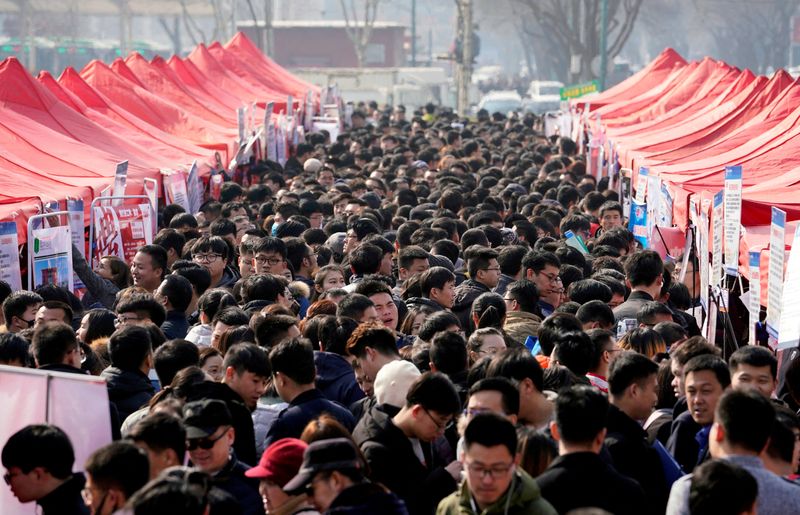By Ryan Woo, Ethan Wang
BEIJING (Reuters) – China's rising unemployment is leaving millions of university graduates struggling, with some forced to accept low-paid jobs or even survive on their parents' pensions. The situation has created a new working class of “rotten kids”.
The phrase has become a buzzword on social media this year, similar to the popular term “rotten-tail buildings” for the tens of millions of unfinished homes that have plagued China’s economy since 2021.
This year, a record number of graduates are seeking jobs in a labor market struggling with the fallout from COVID-19 and stricter regulations in the country's financial, technology and education sectors.
The unemployment rate for China’s roughly 100 million youth aged 16 to 24 rose above 20% for the first time in April last year. When it hit a record high of 21.3% in June 2023, officials abruptly suspended the data series to reassess how the figures were compiled.
A year later, youth unemployment is still a problem. The new unemployment rate peaked at 17.1% in July 2024, while 11.79 million students graduated this summer, while the economy continues to suffer from the housing crisis.
President Xi Jinping has repeatedly stressed that finding jobs for young people remains a top priority. The government has called for more channels for young people to reach potential employers, such as job fairs, and has rolled out supportive business policies to boost recruitment.
“For many Chinese graduates, better career opportunities, social mobility and a brighter life outlook — all things once promised by a college degree — have become increasingly elusive,” said Yun Zhou, assistant professor of sociology at the University of Michigan.
Some unemployed youth have returned to their hometowns to live as 'full-time children', relying on their parents' pensions and savings.
Even those with postgraduate degrees were not spared.
After years of climbing China's ultra-competitive academic ladder, the “bad kids” are discovering that their qualifications don't get them enough jobs in a tough economy.
Their options are limited. They either lower their expectations for well-paid jobs or find a job to make ends meet. Some have also turned to crime.
Zephyr Cao received a master's degree last year from the prestigious China Foreign Affairs University in Beijing.
Cao is now 27 and living back in his home province of Hebei. He has stopped looking for a full-time job because his salary is lower than expected and he is starting to doubt the value of his education.
“If I were to work for three or four more years after my bachelor's degree, my salary would probably be comparable to what I earn now with a master's degree,” Cao said.
Cao said he was considering pursuing a PhD in the hopes that his prospects would improve within a few years.
Amada Chen, a recent graduate of Hubei University of Chinese Medicine, quit her job as a salesperson at a state-owned enterprise last week after just a month.
She blamed her decision on the toxic work culture and her boss's unrealistic expectations. For the first 15 days of her probation, she was also paid only 60 yuan ($8.40) a day, despite working 12 hours a day.
“I cried every day for a week,” she said.
Chen wanted to become a quality inspector or researcher, thinking these jobs would suit her skills as a student of traditional Chinese medicine.
But after more than 130 applications, she was mainly offered vacancies in sales or e-commerce.
Chen said she was completely rethinking her career path and might focus on modeling.
UNCERTAIN OUTLOOK
Unemployment among graduates is not unprecedented.
In 1999, China dramatically expanded university enrollment in an effort to produce better-educated workers and boost its rapidly growing economy.
However, the supply of graduates continued to exceed the number of jobs. In 2007, authorities expressed concern about the availability of jobs. This problem diminished but never disappeared completely, as more young people with degrees entered the labor market.
Even if a student's majors match market needs, the outlook is uncertain.
Shou Chen completed her third year at Beijing University of Posts and Telecommunications this year, majoring in artificial intelligence.
However, after more than a dozen applications, Chen has still not found an internship and remains pessimistic about the job market.
“It could be worse,” she said. “There will be more and more people (in this field).”
According to a study published in June by China Higher Education Research, a journal of the Ministry of Education, the supply of students in higher education will exceed demand from 2024 to 2037. After that, the effects of declining fertility rates will be felt and the gap will narrow significantly.
The number of new university graduates is expected to peak at about 18 million in 2034.
($1 = 7.1436 Chinese Yuan Renminbi)
(Reporting by Ryan Woo and Ethan Wang; additional reporting by Qiaoyi Li and Laurie Chen Editing by Shri Navaratnam)

